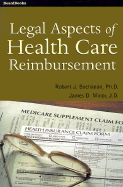|
|
|
|
||||||

|
Legal Aspects of Health Care Reimbursement
By Robert J. Buchanan and James Minor 2001/03 - Beard Books 1587980932 - Paperback - Reprint - 303 pp. US$34.95 Valuable reading not only for lawyers and health care administrators, but for all health care professionals interested in containing inequities, limiting costs, or improving flawed payment mechanisms. Publisher Comments Written in 1985, it presents a historical perspective of reimbursement legislation and regulations with regard to several important aspects of Medicare and Medicaid claims, which have a great potential for fraud and abuse. Focus is on penalties and offenses. Part I deals with Medicare. Several well-documented cases are dedicated to long-term care, inpatient hospital reimbursement, hospice care, and end-stage renal disease. Part II, deals with Medicaid. In addition to inpatient hospital reimbursement and long-term care, there is an informative expose of abortion and family planning services, to include U.S. Supreme Court cases, legislative restrictions, regulations, and litigation. Each chapter concludes with an "Outlook" section that suggests ways of containing inequities, limiting costs or improving flawed procedures. From Henry Berry, Nightingale's Healthcare News, October 15, 2006: With Legal Aspects of Health Care Reimbursement, Buchanan, a professor in the School of Public Health at Texas A&M, and Minor, an attorney, have come up with an invaluable resource for lawyers and anyone else seeking an introduction to the legal and social issues related to Medicare and Medicaid. The administrative costs of Medicare and Medicaid reimbursement have been a heated topic of debate among public officials and administrators of provider healthcare organizations, especially health maintenance organizations. Although inflation and the use of costly medical technology are key factors in the rise in Medicare and Medicaid costs, some control can be gained through appropriate compliance, using more efficient procedures and better detection of fraud. This work is a major guide on how to go about doing this. Though mostly a legal treatise, Legal Aspects of Health Care Reimbursement, first published in 1985, also offers commentary through legislative and regulatory analyses, thereby explaining how healthcare reimbursement policies affect the solvency and effectiveness of the Medicare and Medicaid programs. In discussing how legislation and regulations affect the solvency and effectiveness of government-provided healthcare, the authors offer insight into the much-publicized and much-discussed issue of runaway healthcare costs. Buchanan and Minor do not deny that healthcare costs are out of control and are onerous for the government and ruinous for many individuals. But healthcare reimbursement policies are not the cause of this, the authors argue. To make their case, they explain how the laws and regulations in different areas of the Medicare and Medicaid programs create processes that are largely invisible to the public, but make the programs difficult to manage financially. The processes are not well thought out nor subject to much quality control, with the result that fraud is chronic and considerable. The areas of Medicare covered in the book are inpatient hospital reimbursement, long-term care, hospice care, and end-stage renal disease. The areas of Medicaid covered are inpatient hospital and long-term care plus abortion and family planning services. For each of these areas, the authors discuss the conditions for receiving
reimbursement, the legislation and regulations regarding reimbursement, the
procedures for being reimbursed, the major areas of reimbursement (for example,
capital-related costs, dietetic services, rental expenses); and court cases,
including appeals. Reimbursement practices of selected states are covered. The value of this book is reflected in the authors' ability to distill great amounts of data down to one readable text. It condenses libraries of government and legal documents into a single work. Answers to questions of fundamental importance to healthcare providers - those dealing with qualifications, compliance, reimbursable costs, and appeals - can be found in one place. Timely reimbursement depends on proper application of the rules, which is necessary for a provider's sound financial standing. But the authors specify other reasons for writing this book, to wit: "Providers should have a general knowledge of the law and should not rely on manuals and regulations exclusively." By summarizing, commenting on, and citing cases relating to principal provisions of Medicare and Medicaid, the authors accomplish this objective. The authors also cover the topic of fraud with respect to both Medicare and Medicaid, offering both a legal treatment and commentary. At the end of each chapter is a section titled "Outlook," which contains a discussion of government studies, changes in healthcare policy, or other developments that could affect reimbursement. Although this work was published over two decades ago, much of this discussion is still relevant today. Finally, the book is a call for change. The authors remark in their closing paragraph: "Given the increasing for-profit orientation of the major segments of the health care industry, proprietary providers should be particularly responsive to new efficiency incentives" in reimbursement. In relation to this, "policymakers [should] develop reimbursement methods that will encourage providers to become more efficient." Robert J. Buchanan is currently a professor in the Department of Health Policy and Management in the School of Rural Public Health at the Texas A&M University System Health Sciences Center. James D. Minor, a former law professor at the University of Mississippi, has his own law practice. Robert J. Buchanan is currently a professor in the Department of Health Policy and Management within the School of Public Health at Texas A&M University System Health Sciences Center, College Station, Texas. James D. Minor, formerly a law professor at the University of Mississippi, has his own law practice in Oxford, Mississippi.
|
|
|
|
home
| about us
| contact us
| related
sites |